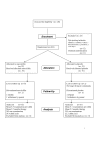Compared to placebo, long-term antibiotics resolve otitis media with effusion (OME) and prevent acute otitis media with perforation (AOMwiP) in a high-risk population: a randomized controlled trial
- PMID: 18513453
- PMCID: PMC2443129
- DOI: 10.1186/1471-2431-8-23
Compared to placebo, long-term antibiotics resolve otitis media with effusion (OME) and prevent acute otitis media with perforation (AOMwiP) in a high-risk population: a randomized controlled trial
Abstract
Background: For children at high risk of chronic suppurative otitis media (CSOM), strategies to prevent acute otitis media with perforation (AOMwiP) may reduce progression to CSOM.
Methods: In a double blind study in northern Australia, 103 Aboriginal infants with first detection of OME were randomised to receive either amoxicillin (50 mg/kg/d BD) or placebo for 24 weeks, or until bilateral aerated middle ears were diagnosed at two successive monthly examinations (success). Standardised clinical assessments and international standards for microbiology were used.
Results: Five of 52 infants in the amoxicillin group and none of 51 infants in the placebo group achieved success at the end of therapy (Risk Difference = 9.6% [95% confidence interval 1.6,17.6]). Amoxicillin significantly reduced the proportion of children with i) perforation at the end of therapy (27% to 12% RD = -16% [-31,-1]), ii) recurrent perforation during therapy (18% to 4% RD = -14% [-25,-2]), and iii) reduced the proportion of examinations with a diagnosis of perforation during therapy (20% to 8% adjusted risk ratio 0.36 [0.15,0.83] p = 0.017). During therapy, the proportion of examinations with penicillin non-susceptible (MIC > 0.1 microg/ml) pneumococci was not significantly different between the amoxicillin group (34%) and the placebo group (40%). Beta-lactamase positive non-capsular H. influenzae (NCHi) were uncommon during therapy but more frequent in the amoxicillin group (10%) than placebo (5%).
Conclusion: Aboriginal infants receiving continuous amoxicillin had more normal ears, fewer perforations, and less pneumococcal carriage. There was no statistically significant increase in resistant pneumococci or NCHi in amoxicillin children compared to placebo children who received regular paediatric care and antibiotic treatment for symptomatic illnesses.
Figures
References
-
- Acuin J. Chronic suppurative otitis media: Burden of illness and management options. World Health Organization (WHO) 2006.
-
- Leach AJ, Boswell JB, Asche V, Nienhuys TG, Mathews JD. Bacterial colonization of the nasopharynx predicts very early onset and persistence of otitis media in Australian aboriginal infants. Pediatr Infect Dis J. 1994;13:983–989. - PubMed
-
- Rosenfeld RM, Bluestone CD. Evidence-Based Otitis Media. Second Edition. BC Decker Inc. 2003.
Publication types
MeSH terms
Substances
LinkOut - more resources
Full Text Sources
Other Literature Sources
Medical
Miscellaneous


